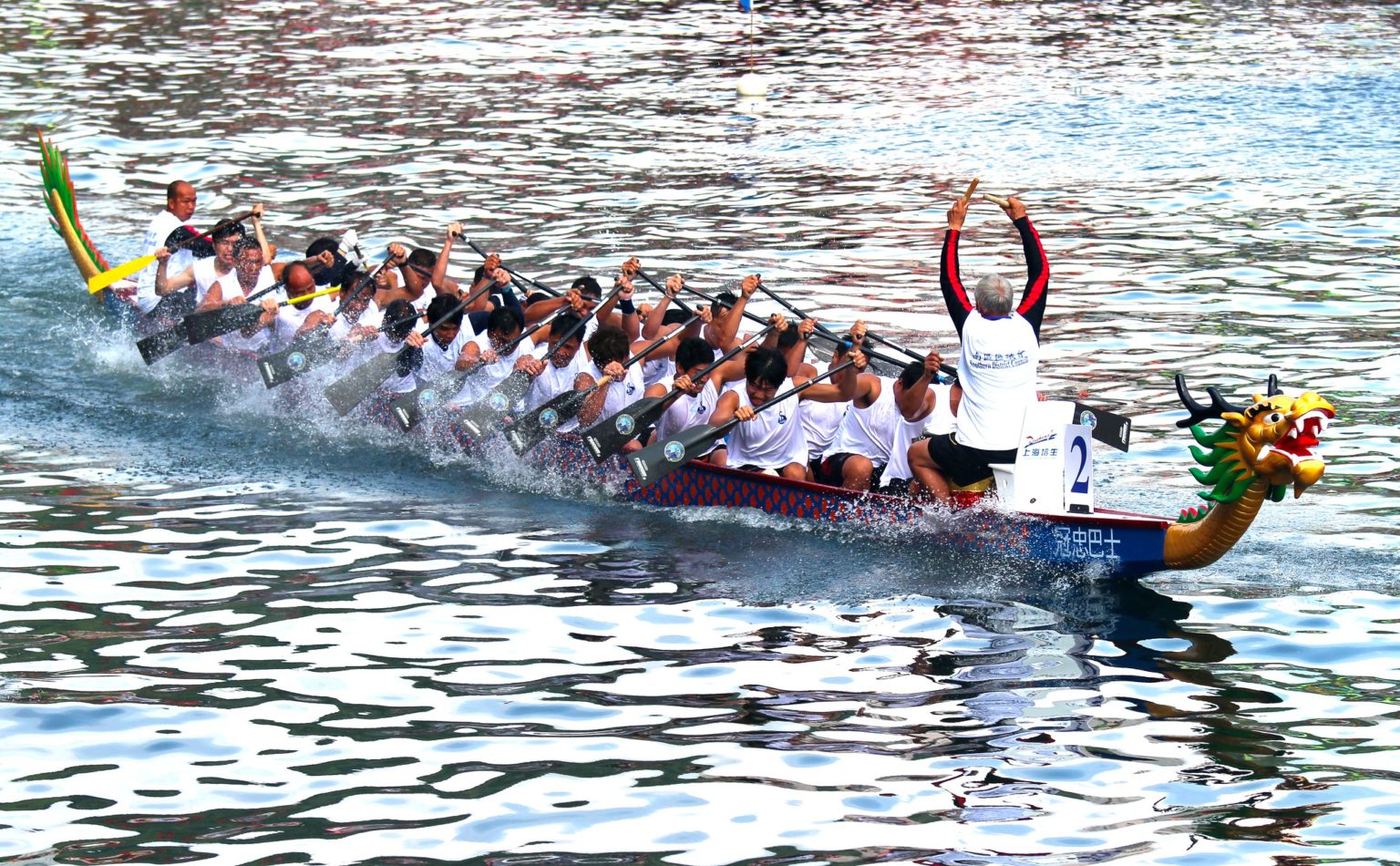The Dragon Boat Festival is a traditional festival with the central themes of warding off evil spirits and keeping diseases, pests, and drought away. Today, dragon boat racing is a sport that people all over the world participate in, but the origins and other traditional practices related to the festival are less known. Its history is rooted in the stories of two significant Chinese figures: Qu Yuan (屈原) and Wu Zixu (伍子胥). The date of this traditional public holiday varies on the Gregorian calendar.
What Is Dragon Boat Festival
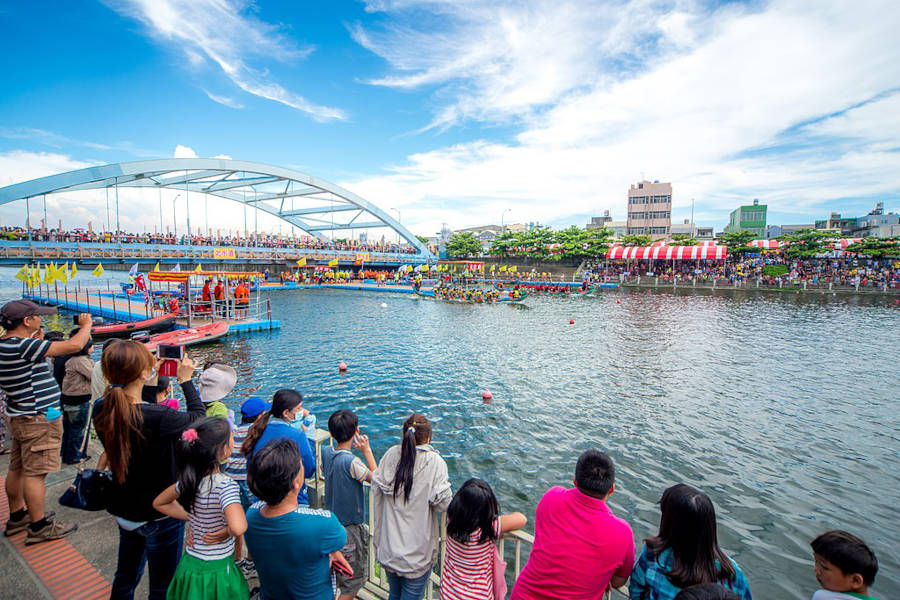
Dragon Boat Festival is celebrated on June 10, 2024. Also known as Tuen Ng Festival (端午節, tuen ng jit in Cantonese) or Double Fifth Festival (雙五節, seung ng jit in Cantonese), the day highlights dragon boat racing as a symbol of the culmination of multiple practices meant to drive away evil energy and invite clean energy into your life.
The name ‘Double Fifth Festival’ comes from the holiday’s occurrence on the fifth day of the five-month lunar calendar. Celebrated all over Asia, the most common activities are watching fierce dragon boat races and eating symbolic foods like sticky rice cooked in lotus leaves.
How To Celebrate Dragon Boat Festival
In modern days, the Dragon Boat Festival is mainly celebrated in Hong Kong, China, Japan, South Korea, Vietnam, and within the Chinese community in other countries. While traditional practices like hanging dried herbs may no longer be seen everywhere, activities like eating festive foods and dragon boat racing are still commonly practised around the world. Different countries have various ways of celebrating, but they all unite around the core ideas of avoiding sickness and warding off evil spirits.
In ancient times, traditional celebrations are key in encouraging a healthy and especially prosperous year ahead:

- Hanging portraits of the guardian deity Zhong Kui (鍾馗), a hunter of demons, in the home to keep dark spirits from entering;
- Hanging mugwort leaves, a Chinese herbal medicine, on the front door to protect the household from illness. Indeed, it’s been found that insects are repelled by mugwort and calamus plants;
- Giving children lucky fragrance pouches called ‘fragrant sachets’ (香囊, heung nong in Cantonese), which are sewn with silk cloth and thread and then filled with fragrances or herbs. Again, the effects are twofold: these bags are worn around the neck or tied to the front of clothing to protect the individual from evil spirits and to deter insects carrying infectious diseases;
- Standing an egg on its end for a day, which is believed to bring prosperity for the year.
The History Behind Dragon Boat Festival
The Dragon Boat Festival is believed to have its origin two thousand years ago in the Warring States period (475-221 BC). During this divisive ancient Chinese era, seven states fought for territorial control until the country was united under the Qin Dynasty.
Chinese figures Qu Yuan, Wu Zixu, and Cao E are said to have lived during this period, and the legends surrounding their lives are key to understanding the history and various modern practices surrounding the festival.
Qu Yuan (屈原)
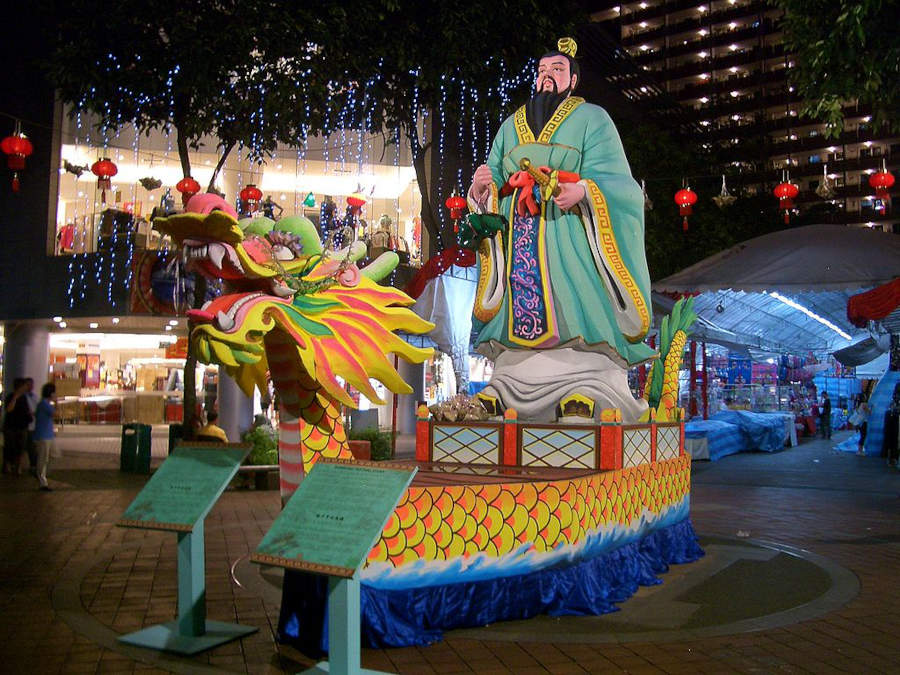
Qu Yuan was a poet and political minister in the Chu state characterized by his classical poetry and political devotion. As the king’s main advisor, Qu Yuan attempted to introduce strong political reform. Other officials became jealous of his high position and manipulated the king into exiling Qu Yuan.
During his exile, Qu Yuan wrote poems to show his love for his province. When the Chu state eventually fell to the Qin state, the story states that Qu Yuan was so devastated that he wrote one final poem and then drowned himself in a river on the fifth day of the fifth lunar month. The legend goes on to say that sympathetic villagers rowed onto the river to retrieve his body.
Unable to find it, they rowed along the river hitting the water with their paddles and beating drums to scare bad spirits away. They also threw lumps of rice into the water to distract fish from eating the body. Scholars write of his death as a form of martyrdom, a respectable symbol of his dedication to his home state. In this way, the traditions of boat racing and consumption of rice dumplings came about to honor the memory of Qu Yuan.
Wu Zixu (伍子胥)
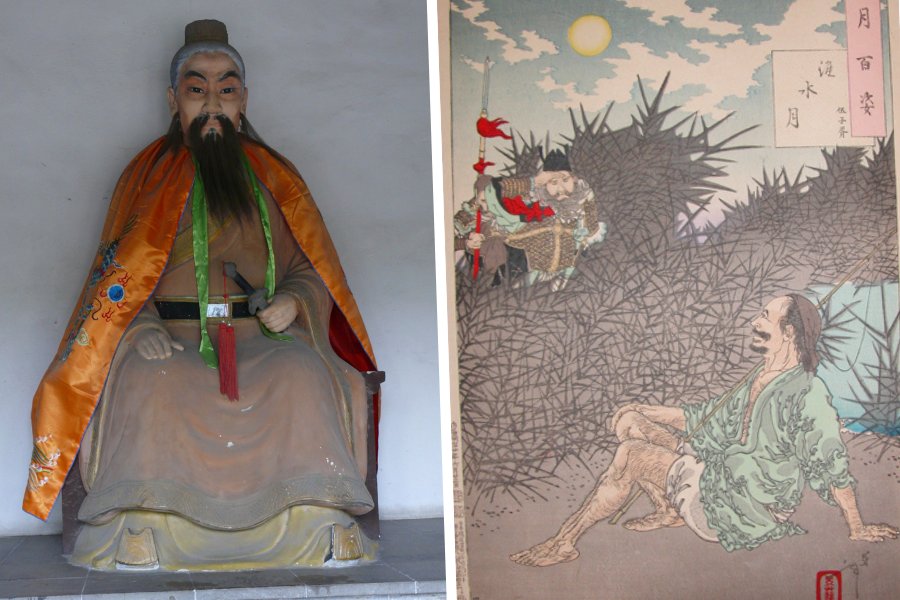
A second origin story tells of Wu Zixu, the ancient premier of Wu state. People in the provinces of Jiangsu and Zhejiang, which is the former territory of the Wu state, more commonly attribute this story to the birth of Tuen Ng Festival.
Wu’s brother and father were imprisoned on order of the king. Eventually, both were executed. Wu Zixu fled to Wu state in fear that he would experience the same fate. He eventually helped Wu state’s king conquer Chu state, avenging his family members’ execution and advancing in political rank. But when the king’s successor was bribed by an opposing state’s official (a state that Wu had advised the successor to target), Wu Zixu was commanded to commit suicide.
Wu’s body was thrown into a river on the fifth day of the fifth lunar month and locals held dragon boat races to show solidarity with him.
Cao E (曹娥)
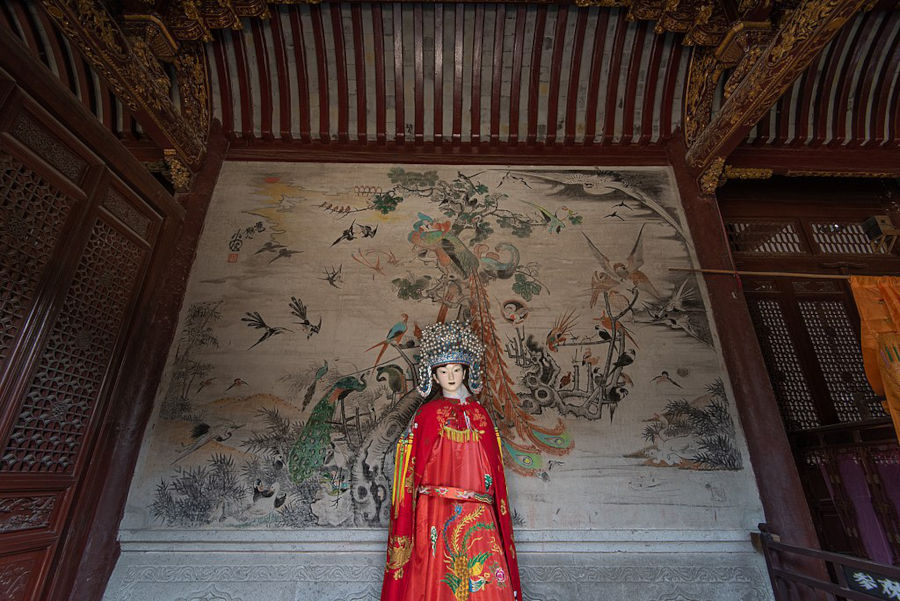
Another popular origin story behind Tuen Ng Festival is about a loyal daughter named Cao E. The young girl’s father drowned in a river, his body lost to the water. Cao E searched along the riverbanks for his corpse for days, wanting to give her father a proper burial. Unable to contain her sorrow, on the fifth day of the fifth lunar month, the filial daughter jumped into the river. Cao E’s body was discovered days later. In her arms, she held her father, having finally found him in death.
What To Eat During Dragon Boat Festival?
In Hong Kong
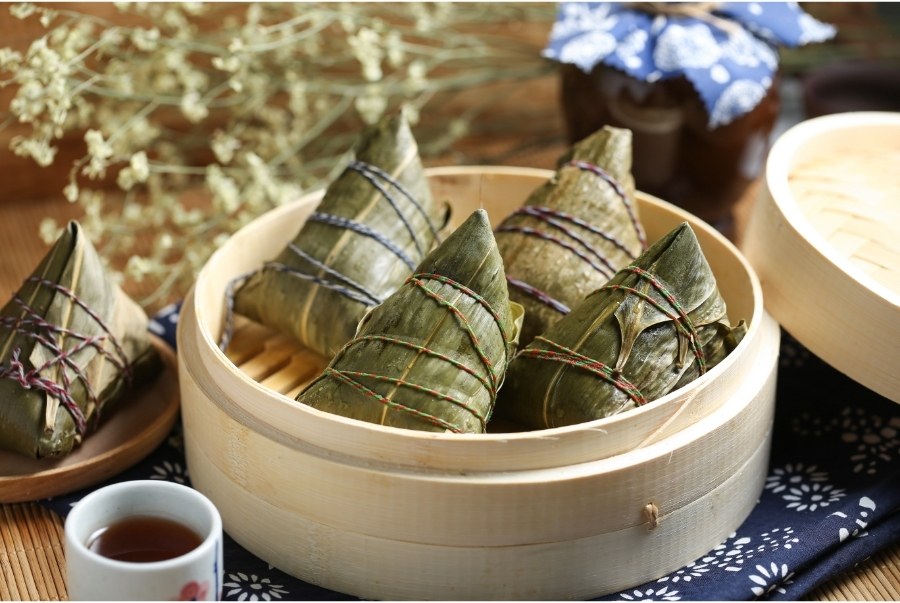
The most traditional food related to the Dragon Boat Festival is the rice dumpling known as zongzi (粽子), simply called jung (糉) in Hong Kong. The dumpling starts with sticky glutinous rice that is soaked in alkaline water. The sticky rice is wrapped in bamboo leaves in a triangular shape, filled with precooked ingredients, tied with string, and boiled in water. The common fillings for glutinous rice dumplings are egg yolk, pork, lotus seeds, green bean paste, peanuts, and other nuts.
The lumps of rice thrown into the river in the story of Qu Yuan have evolved into this elaborate, rich food that sees variations in fillings and bamboo leaf shapes throughout Asian countries.
In Taiwan & Mainland China
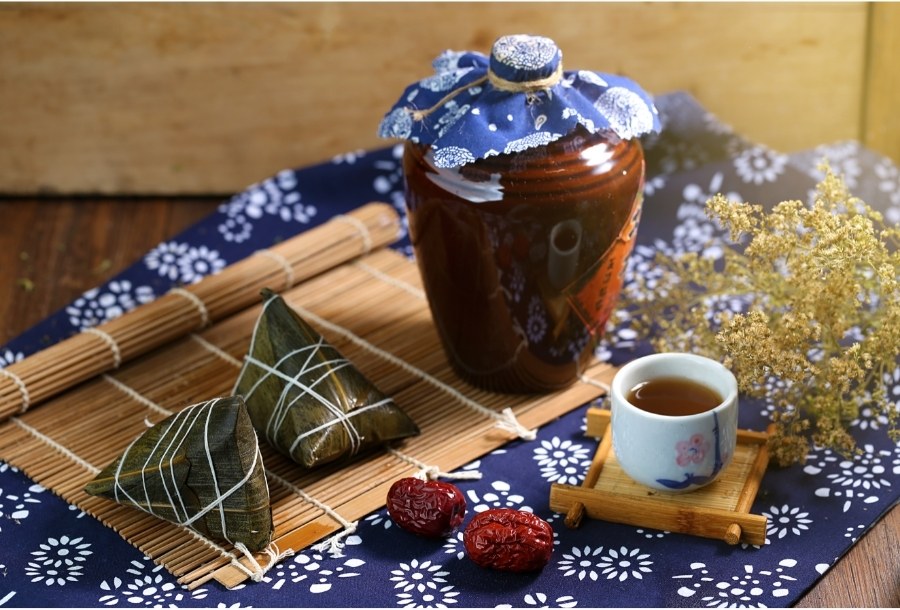
In Taiwan, multiple ingredients like shiitake mushrooms, shallots, and baby shrimp are stir-fried and then steamed inside rice dumplings. In Northern China, the sticky rice dumplings tend to be sweeter; in Southern China, the rice dumplings are salty and more rectangular; in Nanchang, Jiangxi Province, people boil eggs in tea and dye them red to be hung in a bag around children’s neck for good luck.
Another culinary tradition during Tuen Ng Festival is drinking realgar wine. Chinese yellow wine is combined with trace amounts of powdered realgar (雄黄, xiong huang in Putonghua), which is a dark yellow arsenic sulphide mineral. Here again, the beliefs are both practical and symbolic; the wine is an antidote for poison and also thought to chase away evil energy.
What Is The Significance Of Dragon Boat Races?
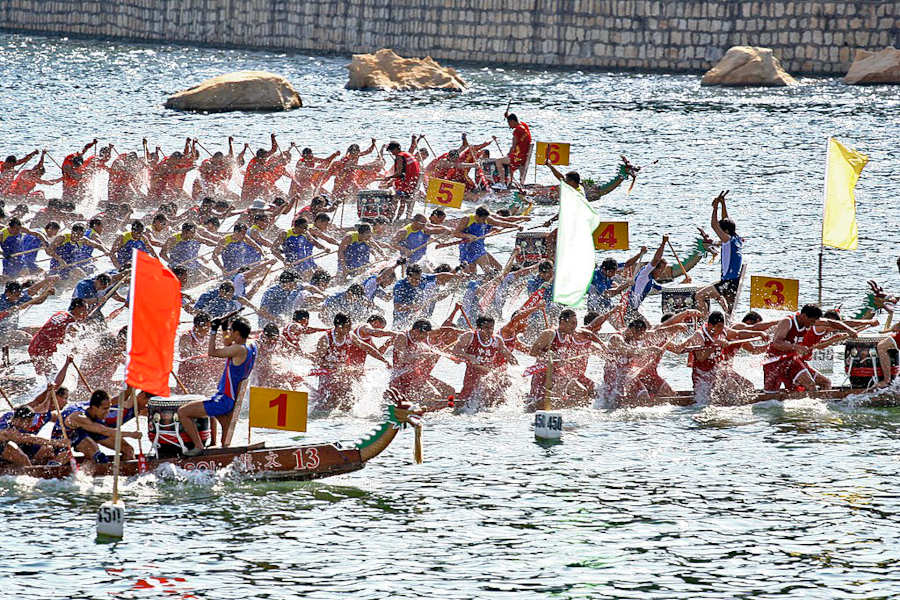
The dragon boat race is the most exciting, colourful event during Tuen Ng Festival. The famous dragon boat is a long, narrow boat painted with a Chinese dragon head and tail. The number of paddlers can stretch from 10 to 50, with the typical team consisting of 22 people. Along with the paddlers, there is also the leader at the bow beating the timekeeping drum and a steerer at the rear.
Teamwork is an essential factor as all the paddlers need to move in unison, following the rhythm of the beating drum. This ritual of the beating drum and synchronicity placates the rain gods so that they bring raindrops in the year to come, and also celebrates rice growth in the summer.
Since 1976, dragon boat racing has started to become more popular as the Hong Kong government under British rule marketed dragon boat racing as a sport to attract tourism. As the International Dragon Boat Federation was built in 1991, since then dragon boat racing has been practiced in lots of countries around the world. The Hong Kong Dragon Boat Race attracts international athletes to compete every year and races have become so popular that lots of countries such as the United States, United Kingdom, Japan, Singapore, Malaysia, Vietnam, and Germany have their own dragon races.
The Dragon Boat Festival or Double Fifth Festival has grown from a legend based on defending the home from evil spirits to an international tradition. The world has grown to share its praise and Hong Kong has embraced it wholeheartedly. The Dragon Boat race remains a sport of unity and an amazing festival to respect both the legends and the current culture surrounding it.
Where can I watch the dragon boat races in Hong Kong this year?
This year, the following dragon boat races are scheduled:
- 2024 Eastern District Dragon Boat Race — June 2, 2024
- Aberdeen Dragon Boat Race 2024 — June 10, 2024
- Stanley International Dragon Boat Championships — June 10, 2024
- Sai Kung Tuen Ng Festival — June 10, 2024
- Sha Tin Dragon Boat Race — June 10, 2024
- Tai Po Dragon Boat Race — June 10, 2024
- Tuen Mun Dragon Boat Race — June 10, 2024
- Hong Kong International Dragon Boat Races — June 15-16, 2024
- Tai O Dragon Boat Water Parade & Dragon Boat Races — June 30, 2024
Head to our Dragon Boat Festival event guide for more details.
FAQ about Dragon Boat Festival
What is the significance of dragon boat races?
Dragon boat races are the most important event during Dragon Boat Festival; paddling to a drum beat represents asking the gods for rain in the coming season and defending the community from evil spirits.
How did Dragon Boat Festival start?
The most common story describing Dragon Boat Festival, or Double Fifth Festival’s origin, is about Qu Yuan. He was a loyal political minister who drowned himself when the state he loved was defeated in battle.
What do people eat during Dragon Boat Festival?
The most common festival foods eaten during Dragon Boat Festival (also called Tuen Ng Festival) are sticky rice dumplings, ‘jiandui’ fried sesame balls, and yellow realgar wine.
Other traditional Chinese festivals: Lunar New Year — Lunar New Year Fair — Birthday of Che Kung — Chinese Lantern Festival — Kwun Yum Treasury Opening Festival — Ching Ming Festival — Tin Hau Festival — Cheung Chau Bun Festival — Buddha’s Birthday — Birthday of Tam Kung — Dragon Boat Festival — Birthday of Kwan Tai — Qixi Festival — Hung Shing Festival — Hungry Ghost Festival — Mid-Autumn Festival — Monkey King Festival — Birthday of Confucius — Chung Yeung Festival — Winter Solstice Festival.
Header image credits: eLjeProks via WikiCommons


